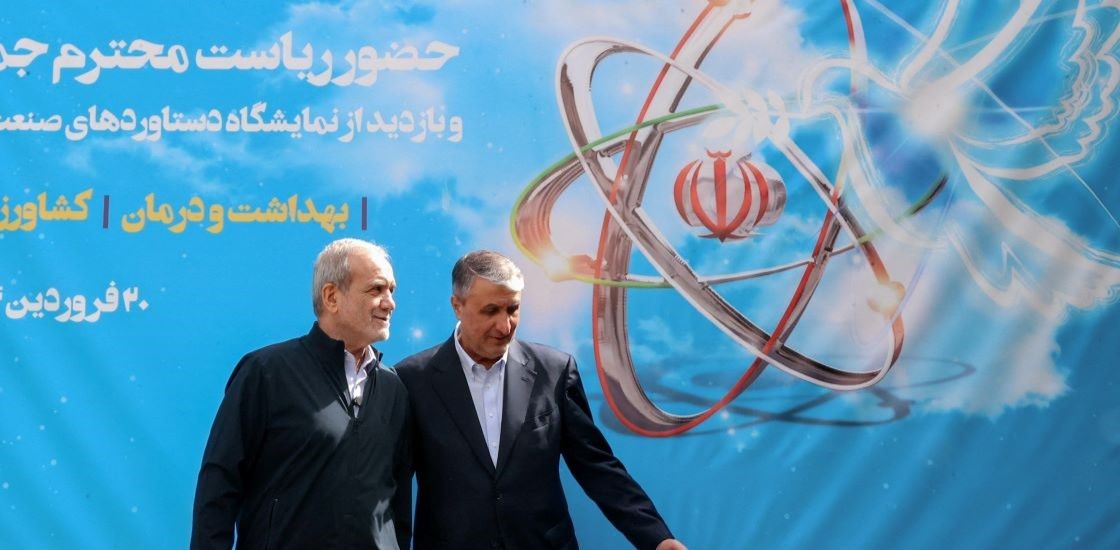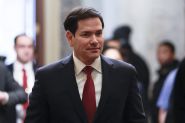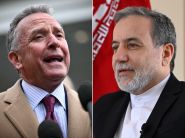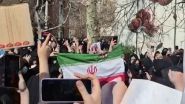- Home
- Middle East
- Iran Says Seeks "Real and Fair" Deal as US Insists on Direct Negotiations

A handout picture provided by the Iranian presidency shows President Masoud Pezeshkian (L) and the Atomic Energy Organisation of Iran (AEOI) chief Mohammad Eslami (R) during the "National Day of Nuclear Technology", in Tehran, on April 9, 2025. ©Iranian Presidency / AFP
White House spokeswoman Karoline Leavitt insisted Friday that the upcoming talks between the United States and Iran in Oman would be direct. “I want to make that very clear,” she told reporters in Washington. “The president believes in diplomacy, direct talks, and talking directly in the same room,” she said.
Her comments came just a day before a high-stakes diplomatic meeting between the two longtime adversaries, amid rising tensions over Iran’s nuclear program. US special envoy Steve Witkoff and Iranian Foreign Minister Abbas Araghchi are expected to lead the discussions in Muscat, where Oman is once again playing mediator.
Iran has maintained the talks will be indirect, conducted via intermediaries. “The talks will be conducted indirectly through the exchange of texts,” claimed Iran’s Fars news agency. But the White House doubled down on its message: the talks are meant to be face-to-face.
On Friday, a senior aide to Iran’s supreme leader Ayatollah Ali Khamenei said Tehran was seeking a “real and fair” agreement with Washington. “Far from putting up a show and merely talking in front of the cameras, Tehran is seeking a real and fair agreement. Important and implementable proposals are ready,” said Ali Shamkhani, also confirming Araghchi’s full mandate to negotiate.
President Donald Trump, who returned to the White House in January, has reignited pressure on Iran over its nuclear ambitions. Last month, he sent a letter to Khamenei urging negotiations but warned military action remained “absolutely” on the table if Iran refused to comply.
The prospect of military confrontation has been underlined by Trump’s remarks that US ally Israel would “obviously be very much involved in that, be the leader of that” if force became necessary.
As tensions escalate, Iran has hinted it could expel UN nuclear inspectors—a move Washington warned would constitute a major “escalation.”
On Friday, Iran’s foreign ministry spokesman Esmaeil Baqaei said the country was “giving diplomacy a genuine chance in good faith and full vigilance,” while urging the US to show appreciation for this decision, despite what he called its “hostile rhetoric.”
Shamkhani also warned that persistent threats could backfire. “Transfer of enriched materials to secure locations may also be considered,” he added, referring to Iran’s uranium enrichment activities. Iran currently enriches uranium up to 60% purity, edging closer to the 90% level needed for a nuclear weapon, though it denies any intention to build one.
Deputy Foreign Minister Majid Takht-Ravanchi said Friday that if the US avoids “irrelevant issues and demands” and drops its threats, “there is a good possibility of reaching an agreement.”
During his first term, Trump withdrew the US from the 2015 nuclear accord, which had lifted sanctions in exchange for curbs on Iran’s nuclear programme. Tehran remained in compliance for a year before scaling back its commitments.
The EU reiterated on Friday that “there is no alternative to diplomacy” in resolving the nuclear issue.
Meanwhile, Iran’s hardline media remains skeptical. The conservative Kayhan newspaper called the US approach a “failed strategy” and said sanctions had only strengthened Iran’s resolve. “They still think that they can stop this nation and country with threats and intimidation, psychological operations, or stupid actions,” said nuclear chief Mohammad Eslami.
Menna Zaki and Payam Doost Mohamadi, with AFP
Read more



Comments